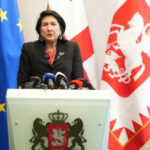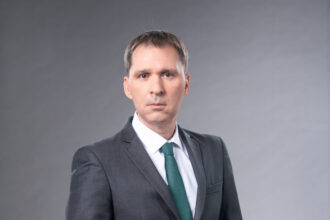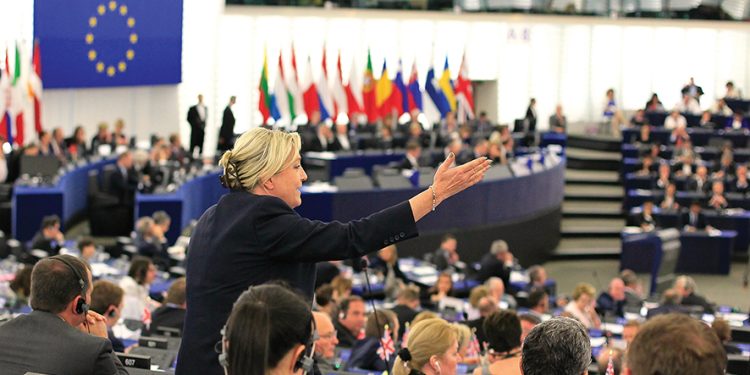This week, Radio Free Europe/ RL’s Georgian Service sat with Daniel Foubert a geo-economist and founder of Excalibur Insight International Affairs Consultancy, a Polish-French. They discussed the European Parliament Elections and their impact on France, Germany, EU and Georgia.
Let’s start with the winners and losers in the EP elections. The far right claims it was their win, but what kind of victory are we talking about?
The seats in the Parliament don’t show a significant difference. Marine Le Pen’s group ID gained about 20 seats, but that’s not enough to win a majority. Von Der Leyen is likely to be supported by ECR, Meloni and is not a “far-right” is she? She is a conservative, a kingmaker and she’s at the center of everything. The far right’s victory won’t make much of a difference, but it will give them more leverage in negotiations.
I don’t think that the European Parliament is the place where the biggest change will occur. The biggest change that will affect the EU as a whole was at the national-level – in France. The elections there produced a major tsunami of political activity, which I believe will lead to the fall of the Macron government. Every poll shows that their situation is getting worse, and they may be forced to form an alliance with the extreme right or left. I don’t know how a government like that would function, and it will have an impact on them both at the national and EU levels. Take the Ukraine War, for instance. Marine Le Pen’s pro-Russian stance will now be a major factor in all matters pertaining Ukraine. Yes, I remember her changing her stance on several occasions. She said that the French should not blush when they send weapons to Ukraine. But a few months ago, she was adamant that France shouldn’t even be involved. She changed her tune only after she realized that it would happen anyway. I don’t trust her, and neither should anyone else.
A Macron government aligning itself with the left would be equally disastrous – the French extreme-left is extremely pro Russian, perhaps even more so than Le Pen. They are “antiimperialist,” but with a very specific meaning. For them, anti-USA, anti NATO, anti-Western powers is what they mean. Western colonialism bad, Russian colonialism ok. The deeply rooted French communist traditions are probably also a contributing factor to this perception.
What do you make of Macron’s decision for a snap election? What is his goal?
Chirac achieved the same thing in 1997. He wants to pass the blame, the problems and the government to someone else. He can’t be President a third time but he’ll stay on for three more years. He’s clever, he knows this is enough time to destroy a opposition that has no experience in governing a country. He will hand them the keys to the nation, and they’ll make a mess of it. Then people will say “hey, it was not that bad when Macron’s people were in control, in fact, those were the good times.”
This domestic political tsunami, however, will also result in a mess for the EU, as France will be preoccupied with domestic issues first and foremost. Macron, whether you like him or not had a plan; he knew what to do with the resources of his nation in European affairs; he was focused on the European project. Now there will conflict, France will focus on national interests to the detriment of any international collaboration. I don’t know what kind of cooperation Le Pen is interested in.
In Germany, Scholz’s Social Democrats suffered a crushing defeat. How will this affect Germany’s foreign and domestic policy?
Scholz will have a lot of problems because his coalition is weak and is getting weaker. Scholz’s credibility as a leader in foreign policy has been severely damaged; he no longer represents Germany. He failed at pretty much everything he set about to do. He didn’t want Ukraine to be supported, he does everything to avoid sending more arms, but he is forced to by Germans and partners in Germany and abroad.
What impact will this have on the Ukrainian War effort and European assistance?
A lot will depend on what happens in France. Will Le Pen behave like Scholz? Saying no initially, hesitating but then consenting at the end? Or will she say “No” with a firm voice, like Orban did in Hungary? I would guess that the first option is likely to be more likely than the second because, once in power, one has a different strategy and responsibilities. When you’re in opposition, criticizing is easier and comes with no cost. Once Le Pen has to take responsibility for decisions and accepts all the consequences, I think she will change her tune.
What is the impact on Georgia? Will the rise of the far right mean less support for democratization and more freedom to use authoritarian anti-western rhetoric, like that of Georgia’s government?
The outcome of the election could go in two directions. Either the moderates will increase their support for Russia’s opponents to counter the Russian networks who support their own opposition, or they will attempt to woo the extremists by moderating support. I think that the Europeanist parties (like Emmanuel Macron) have realized that there is no compromise, no moderate strategy, and they cannot cede any ground to Russia which is waging a war against them.
The European Parliament will continue to work as it has done in the past, based on a consensus among the three major groups at the center. The question is whether France will block the European Union’s efforts to democratize Georgia and Moldova, as it could be worse than the German Chancellor.
Read More @ georgiatoday.ge













